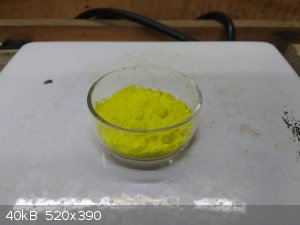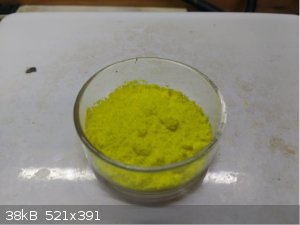
Chem Science - 10-12-2019 at 19:00
Greetings from Argentina !!
so i want to get some ammonium dichromate to make the famous ammonium dichromate volcano. But to get there i need Ammonium Chromate, so here is my
best experimental procedure to make it
EXPERIMENTAL PROCEDURE:
In an Erlenmeyer flask i added 10 mL of water and 4.75 grams of Potassium Dichromate, the mixture is heated to fully dissolve the chromate.Then was
added 1.85 grams of sodium carbonate in small portions. The reaction is happening is:
K2Cr2O7 + Na2CO3 = K2CrO4 + Na2CrO4 +
CO2
After all the carbonate is added, i stir for 2 min and let the mixture cool to room temperature. Then add 10 mL of 20% ammonia solution along with 5mL
of ethanol which causes the precipitation of a yellow powder, these is filtered and the flask washed with 2,5 mL of 20% ammonia, the precipitate is
washed in the funnel 3 times with 20% ammonia solution and 2 times with 5mL of 96% ethanol.The product was dryied in a hot plate and the final
recovery was 2.931 grams wich represents a 59.68% yield based on dichromate
COMENT'S
_The yield can possibly be improved by adding more ethanol
_The ammonia washes are important to remove and purify the final product as ammonium chromate is sparingly soluble in ammonia solution.
Simple and short post  Hope these is useful
Hope these is useful 


[Edited on 11-12-2019 by Chem Science]
fusso - 10-12-2019 at 20:58
Wrong wrong wrong (facepalm). You shouldn't add Na2CO3. The Na2CO3 deprotonated all Cr2O7 2- to make CrO4 2-. Now where's the proton for NH3? None.
Na2CO3 removed it before NH3 could. So the final product you have is actually KNaCrO4 not (NH4)2CrO4.
woelen - 10-12-2019 at 23:49
If I look at the color of your product, then I indeed think that you precipitated K2Cro4, Na2CrO4 or some mixed Na/K chromate.
Ammonium chromate is golden yellow, not the bright yellow you have here.
Chem Science - 11-12-2019 at 08:56
I did analysis with Uranyl Acetate/Zinc acetate and give negative for sodium. And Nessler reagent gave positive for ammonium.
I have Sodium Cobaltinitrite but it doesn't work in presence of ammonium ions.
These are the Reactions i expected to happen
Cromate-Dichromate Equilibrium... Cr2O7(2-) + H2O = 2CrO4(2-) + 2H(+)
Carbonate Reaction is then............. CO3(2-) + 2H(+) = CO2 + H2O
Total ......................................... Cr2O7(2-) + CO3(2-) = 2CrO4(2-) + CO2
So ............................................... Na2CO3 + K2CrO4 = Na2CrO4 + K2CrO4
There are the equilibium of dissociation ..... K2CrO4 = 2K(+) + CrO4(2-)
.................................................................. Na2CrO4 = 2Na(+) + CrO4(2-)
And also in ammonia solution .. K2CrO4 + 2NH3 + H2O = (NH4)2CrO4 + 2KOH
............................................... Na2CrO4 + 2NH3 + H2O = (NH4)2CrO4 + 2NaOH
Ammonium Chromate is sparingly soluble in ammonia solution so it precipitates out, Ethanol helps these because NaOH and KOH are soluble while
(NH4)2CrO4 is not.
Meaby the product is more yellow because is wet
Fusso .. amm .. i don't understand what you said :/
woelen - 11-12-2019 at 23:37
Put some of your dried ammonium chromate in a test tube and heat. If it indeed is ammonium chromate, then it decomposes a little bit like ammonium
dichromate, albeit somewhat slower. If it is Na/K chromate, then it just melts and turns dark.
Chem Science - 12-12-2019 at 03:08
Okay i will try and report back 
Boffis - 12-12-2019 at 06:04
One other thing to bear in mind is that soluble chromates have a terrible tendency to form mixed crystals, often with a definite composition for
instance K2NaLi(CrO4)4 and Na3Li(CrO4)4. The latter grows into really nice yellow crystals and can be recrystallised from water without changing its
composition as described in a book on crystal growing. I can't remember of the title of the book and I once ran a search to see if I could find a
download of the book but couldn't

 Hope these is useful
Hope these is useful 
